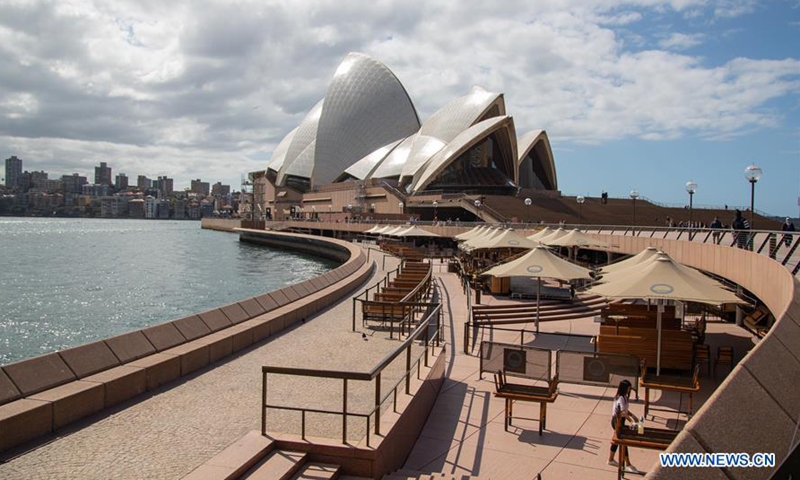Australia nervous at losing Chinese market
By GT staff reporters Source: Global Times Published: 2020/11/4 21:28:40
Import suspension sparks panic, may add to job losses: expert

The dining zone of the Sydney Opera House is closed in Sydney, Australia, Sept. 1, 2020. Tourism in Australia has been heavily impacted by the COVID-19 pandemic. (Xinhua/Hu Jingchen)
Chinese analysts believe the reported visit of Australian ambassador to China to the 3rd China International Import Expo (CIIE) in Shanghai, reflects Australia's need for the Chinese market amid worsening diplomatic ties and its economic consequences.
The envoy Graham Fletcher's trip came after Bloomberg News report that China had asked traders to stop purchasing at least seven categories of Australian products - coal, barley, copper ore and concentrate, sugar, timber, wine and lobsters. The "most sweeping" halt will begin on Friday.
The Australian Ambassador to China Graham Fletcher is reportedly to visit the CIIE, according to media reports. The visit came after China halted seven categories of Australian goods from the market.
The news has apparently sent shockwaves to Australia.
In an article titled "Fears more trade bans to come as China halts imports of Australian timber, lobsters, barley," ABC News said sanctions on Australian lobster exports would pose a "dire threat" to the industry in Australia, which typically exports more than "90 percent of its catch to China."
Some Australian politicians also urged its government to recognize the fact that there is no way to separate the Australian economy from China.
Former Australian Ambassador to China Geoff Raby wrote in his new book that the complementarities between the two economies "are so profound that Australia's economic dependency on China will not change" unless Australians choose to accept a major cut in their living standards.
The former diplomat told The Guardian that Australia turning to other markets is "nothing more than wishful thinking."
But analysts warned that Chinese consumers' confidence in Australian products would significantly drop if Australia continues to sabotage bilateral relations, which would cost Australia its best and biggest market, jobs and an opportunity to quickly recover from the pandemic.
Chen Hong, director of the Australian Studies Center at East China Normal University in Shanghai, told the Global Times on Wednesday that despite some politicians' will to repair the ties, it will take a long time for Australia as a whole to sober up, analysts said.
What the Australian government has been doing since this year in spearheading the US' anti-China campaign and restricting Chinese firms has damaged bilateral relations.
Australia has been releasing messages urging its business community and international education community to "diversify" its market, which encourages and promotes the so-called "decoupling" from China, Chen said.
However, decoupling apparently was not an option for many Australian companies, which exerted great effort to explore the Chinese market.
But whether Chinese consumers welcome Australian commodities is another question.
Chen warned that if Australia continues to sabotage bilateral relations, it will pay an unbearable price.
Chinese consumer confidence in Australian products will drop, and "there is no substitute for the Chinese market for Australia. But for Chinese people, Australian goods have many alternatives," Chen said.
John Ross, a senior fellow at the Chongyang Institute for Financial Studies of Renmin University of China, warned on Tuesday that "being a mouthpiece for US aggression against China will cost Australian jobs."
He tweeted that China has made clear to Australians that their interests lie in win-win peaceful relations with China, which gives Australians jobs and income, not with Australia following the path of its present government of an ideological new Cold War imposed by the US.